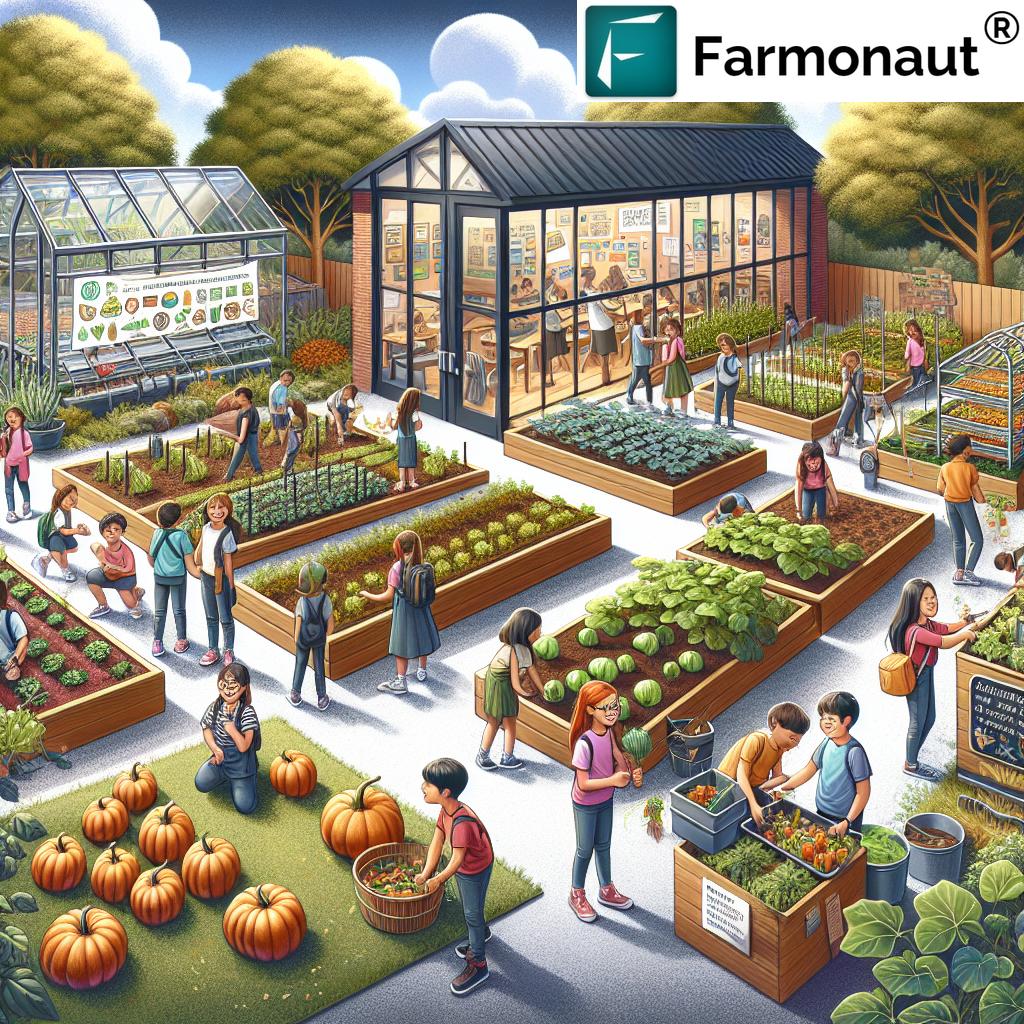Inspiring Alberta’s Future: Virtual Farm Tours and Ag-Mazing Classroom Resources for Growing Minds

“Virtual farm tours can increase student engagement in agriculture by up to 85% compared to traditional classroom methods.”
Welcome to the exciting world of agriculture education! We’re thrilled to embark on this journey with you as we explore innovative ways to inspire the next generation of farmers and food producers. In this comprehensive guide, we’ll delve into the power of agriculture education resources and virtual farm tours, offering educators valuable tools to engage students in the fascinating realm of agriculture.
From pumpkin patch activities to agricultural affirmations, we’ll discover how to cultivate a positive mindset towards farming and food production. We’ll also explore agri-tech innovations and sustainable farming practices, empowering students with knowledge about modern agriculture. So, let’s dive in and uncover the ag-mazing potential of agriculture education!
The Importance of Agriculture Education in the Classroom
In today’s rapidly changing world, it’s crucial that we equip our students with a solid understanding of where their food comes from and how it’s produced. Agriculture education in the classroom serves several important purposes:
- Builds awareness of food systems and sustainability
- Encourages critical thinking about environmental issues
- Promotes healthy eating habits and food literacy
- Inspires future careers in agriculture and related fields
- Fosters appreciation for farmers and their vital role in society
By integrating agriculture into our curriculum, we’re not just teaching facts and figures – we’re nurturing a generation of informed consumers, potential innovators, and future stewards of our planet.
Virtual Farm Tours: Bringing the Field to the Classroom
One of the most exciting developments in agriculture education is the rise of virtual farm tours. These immersive experiences allow students to explore farms and agricultural operations from the comfort of their classrooms, breaking down geographical barriers and providing unprecedented access to the world of farming.
Virtual farm tours of Alberta’s picturesque foothills offer students a unique opportunity to:
- Witness seasonal changes and crop cycles in real-time
- Observe modern farming equipment and techniques in action
- Learn about diverse agricultural products and livestock
- Understand the challenges and rewards of farm life
- Interact with farmers and ask questions directly
These tours not only educate but also inspire, showing students the beauty and complexity of agricultural landscapes right in their own province.
Pumpkin Patch Activities: Hands-On Learning with a Seasonal Twist
Nothing captures the imagination of young learners quite like a visit to the pumpkin patch. Whether it’s a physical field trip or a virtual exploration, pumpkin patch activities offer a wealth of educational opportunities:
- Math skills: Measuring circumference, estimating weight, calculating yield
- Science lessons: Plant life cycles, pollination, and soil health
- Art projects: Pumpkin carving, seed mosaics, and fall-themed crafts
- Language arts: Creative writing prompts and vocabulary building
- Social studies: Exploring the cultural significance of pumpkins in various traditions
These engaging activities not only teach valuable academic skills but also foster a connection to the land and the changing seasons.
Sustainable Farming Practices: Nurturing Environmental Stewardship
As we face global challenges like climate change and food security, it’s more important than ever to educate students about sustainable farming practices. By incorporating lessons on sustainability into our agriculture education programs, we can inspire a new generation of environmentally conscious citizens.
Key topics to explore include:
- Crop rotation and soil conservation techniques
- Water management and irrigation efficiency
- Integrated pest management and reduced chemical use
- Renewable energy in agriculture
- Biodiversity and habitat preservation on farms
These concepts can be brought to life through hands-on experiments, such as creating mini-greenhouses or composting projects, allowing students to see the principles of sustainability in action.

Agricultural Affirmations: Cultivating a Positive Mindset
Positive reinforcement and mindset development are crucial in education, and agriculture is no exception. By incorporating agricultural affirmations for students, we can help foster a sense of confidence and enthusiasm about farming and food production. Here are some examples:
- “I am capable of growing my own food and making a difference.”
- “Farmers are heroes, and I can be one too!”
- “Every seed I plant is a step towards a greener future.”
- “I have the power to make sustainable choices that benefit the planet.”
- “My actions in agriculture can create positive change in the world.”
Encourage students to create their own affirmations and share them with the class, reinforcing the importance of a positive attitude in agriculture.
Food Production Learning: From Farm to Table
Food production learning is an essential component of agriculture education. By understanding the journey of food from farm to table, students gain a deeper appreciation for the complexity of our food systems and the effort involved in feeding communities.
Key aspects to cover in food production learning include:
- Different types of farming (crop, livestock, aquaculture, etc.)
- Food processing and packaging methods
- Transportation and distribution networks
- Food safety and quality control measures
- The role of technology in modern food production
Hands-on activities like creating a classroom garden or organizing a mock farmers’ market can bring these concepts to life and make learning more engaging.
Classroom Agriculture Programs: Bridging the Gap
Classroom agriculture programs play a vital role in bridging the gap between urban and rural communities, helping students understand the importance of agriculture in their daily lives. These programs often include:
- Guest speakers from the agricultural sector
- Interactive workshops on various farming topics
- Field trips to local farms and food processing facilities
- Agriculture-themed science fairs and projects
- Career exploration in agriculture and related industries
By partnering with local farmers and agricultural organizations, schools can create rich, immersive experiences that bring agriculture to life for students of all backgrounds.
Farm Waste Management: Teaching Environmental Responsibility
Farm waste management is a crucial aspect of modern agriculture that offers valuable lessons in environmental stewardship and resource conservation. Integrating this topic into agriculture education helps students understand the importance of responsible farming practices and circular economy principles.
Key areas to explore in farm waste management include:
- Composting techniques and benefits
- Recycling and upcycling of farm materials
- Anaerobic digestion for biogas production
- Proper disposal of hazardous materials
- Water treatment and conservation methods
Classroom activities could include setting up a small-scale composting system or designing innovative solutions for farm waste reduction.
Agri-tech Innovations: The Future of Farming
Introducing students to agri-tech innovations not only excites them about the future of farming but also prepares them for potential careers in this rapidly evolving field. Some cutting-edge technologies to explore include:
- Precision agriculture using GPS and satellite imagery
- Drone technology for crop monitoring and management
- Vertical farming and hydroponics
- Artificial intelligence in farm decision-making
- Robotics and automation in agriculture
Hands-on activities could involve building simple robots for plant care or using apps to analyze satellite images of farmland.
At Farmonaut, we’re committed to advancing precision agriculture through innovative satellite-based solutions. Our technology helps farmers monitor crop health, manage resources efficiently, and make data-driven decisions. While we don’t directly provide educational programs, our platform can serve as an excellent real-world example of agri-tech in action for students learning about modern farming practices.
Growing Sustainable Produce: From Classroom to Community
Engaging students in growing sustainable produce not only teaches them valuable skills but also connects them to their food source and the wider community. Here are some ideas for incorporating sustainable growing practices into the classroom:
- Create a school garden or greenhouse
- Implement vertical gardening techniques for small spaces
- Explore aquaponics systems combining fish farming and plant cultivation
- Practice companion planting and natural pest control methods
- Organize a harvest festival to share produce with the community
These projects not only teach students about sustainable agriculture but also foster teamwork, responsibility, and a sense of accomplishment.
Downloadable Resources: Tools for Educators
To support educators in implementing these agriculture education initiatives, we’ve compiled a list of valuable downloadable resources:
- Lesson plans on various agricultural topics
- Virtual farm tour guides and activity sheets
- Printable posters illustrating farm-to-table processes
- Agricultural vocabulary flashcards
- Farm-themed math and science worksheets
These resources are designed to be easily integrated into existing curricula, making it simple for teachers to bring agriculture into their classrooms.
“Over 90% of educators report improved student understanding of sustainable farming practices after using interactive ag-education resources.”
Engaging Activities for All Ages
Agriculture education can be adapted for students of all ages. Here are some age-appropriate activities to consider:
- Elementary: Seed planting experiments, farm animal crafts
- Middle School: Design a farm layout, create a farm-to-table board game
- High School: Develop a business plan for a sustainable farm, conduct soil analysis experiments
By tailoring activities to different age groups, we can ensure that agriculture education remains engaging and relevant throughout a student’s academic journey.
The Impact of Agriculture Education
The impact of comprehensive agriculture education extends far beyond the classroom. By fostering an understanding and appreciation for agriculture, we’re helping to create:
- Informed consumers who make sustainable food choices
- Future innovators in agricultural technology and practices
- Advocates for farmers and rural communities
- Environmentally conscious citizens
- Potential career pathways in agriculture and related fields
The knowledge and skills gained through agriculture education can have a lasting impact on students’ lives and the world around them.
Leveraging Technology in Agriculture Education
In today’s digital age, technology plays a crucial role in enhancing agriculture education. Here are some ways to incorporate tech into your agriculture curriculum:
- Use mobile apps for plant identification and soil testing
- Explore online simulations of farm management
- Incorporate virtual reality experiences of different farming environments
- Utilize data visualization tools to analyze crop yields and weather patterns
- Engage with social media to connect with farmers and agricultural experts worldwide
Farmonaut’s satellite-based farm management platform is an excellent example of how technology is revolutionizing agriculture. While our primary focus is on serving farmers directly, educators can use our platform as a case study to demonstrate real-world applications of satellite technology and data analytics in modern farming.
Celebrating Agriculture: Events and Contests
Organizing events and contests can be an excellent way to generate excitement about agriculture and showcase student learning. Consider implementing:
- An annual “Ag Day” celebration with exhibitions and demonstrations
- A “Design Your Dream Farm” contest encouraging creativity and planning skills
- A harvest festival featuring student-grown produce
- An agricultural innovation challenge for older students
- A farm-themed art or photography contest
These events not only motivate students but also provide opportunities to involve the wider community in agriculture education.
Agriculture Education Resources Comparison
| Resource Type | Target Age Group | Key Learning Objectives | Engagement Level | Time Required | Technology Requirements | Curriculum Integration |
|---|---|---|---|---|---|---|
| Virtual Farm Tour | All Ages | Farm Operations, Crop Cycles | High | 1-2 hours | Internet Access, VR Headset (optional) | Science, Social Studies |
| Pumpkin Patch Activity | Elementary | Plant Life Cycles, Seasons | High | 2-3 hours | None | Science, Math, Art |
| Sustainable Farming Workshop | Middle/High School | Environmental Stewardship, Resource Management | Medium | Half Day | Internet Access | Science, Environmental Studies |
| Agri-tech Simulation | High School | Precision Agriculture, Data Analysis | High | 1-2 hours | Computers, Specialized Software | Technology, Math |
| Farm Waste Management Project | Middle/High School | Sustainability, Circular Economy | Medium | Ongoing (1-2 weeks) | Basic Lab Equipment | Science, Environmental Studies |
Frequently Asked Questions (FAQ)
Q: How can I incorporate agriculture education into my existing curriculum?
A: Start by identifying connections between your current subjects and agricultural topics. For example, you can use farm-related word problems in math or study plant biology in science. Gradually introduce agriculture-themed projects and activities that align with your learning objectives.
Q: Are there any grants or funding available for agriculture education programs?
A: Yes, many organizations offer grants for agriculture education initiatives. Check with your local agriculture department, farm bureaus, and educational foundations for funding opportunities.
Q: How can I arrange a virtual farm tour for my class?
A: Reach out to local farms, agricultural organizations, or education-focused farming initiatives. Many have developed virtual tour programs in response to the increasing demand for remote learning experiences.
Q: What are some simple ways to start a school garden with limited space?
A: Consider container gardening, vertical gardening systems, or even indoor hydroponic setups. These methods allow for gardening in small spaces and can be great learning tools for students.
Q: How can I make agriculture education relevant for urban students?
A: Focus on the farm-to-table concept, urban farming initiatives, and the role of technology in modern agriculture. Emphasize the connections between agriculture and daily life, such as food choices and environmental impact.
Conclusion: Nurturing the Seeds of Knowledge
As we’ve explored throughout this blog post, agriculture education offers a wealth of opportunities to engage, inspire, and educate students about the vital world of farming and food production. By implementing virtual farm tours, hands-on activities, and innovative classroom programs, we can cultivate a deep appreciation for agriculture and its crucial role in our lives.
From pumpkin patch adventures to cutting-edge agri-tech explorations, the possibilities for learning are as vast and varied as the agricultural landscape itself. By embracing these educational resources and approaches, we’re not just teaching facts – we’re nurturing the seeds of knowledge that will grow into a lifelong understanding and appreciation of agriculture.
Let’s continue to inspire Alberta’s future and beyond, creating a generation of informed, engaged, and enthusiastic agricultural advocates. Together, we can ensure that the future of farming is bright, sustainable, and truly ag-mazing!
While Farmonaut’s primary focus is on providing cutting-edge satellite-based solutions for farmers, we’re excited to see how our technology can inspire and educate the next generation of agricultural innovators. By showcasing real-world applications of precision agriculture, we hope to contribute to the broader goal of agricultural education and awareness.
For those interested in exploring Farmonaut’s services, please visit our website or check out our mobile apps:
For developers interested in integrating agricultural data into their own applications, check out our API and API Developer Docs.






